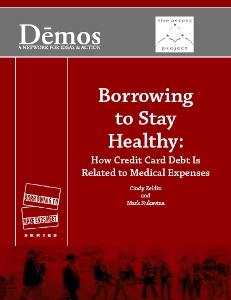
More American Families Charging Co-Pays, Uncovered Procedures and Health Care Costs, Putting Them at Financial Risk
Contact: Timothy Rusch, Demos, 212-389-1407, trusch@demos.org; Andrew Cohen, Access Project, 617-654-9911 x 231, acohen@accessproject.org
Based on data from a national survey of low- and middle-income households with credit card debt, Borrowing to Stay Healthy illustrates that those who identified medical expenses as a factor in their credit card balances had much higher credit card debt than those who did not. Americans with insurance, the report shows, increasingly find themselves paying unmanageable out-of-pocket expenses for health care and do not have assets or income safety nets to cover the extra, often significant costs.
Too many working people are piling up debt on high interest credit cards, and risking their financial security, simply because they have the misfortune of getting sick, said Mark Rukavina, Director of the Access Project and co-author of the report. We can t let this happen in
Key findings from the report include:
- Twenty-nine percent of low- and middle-income households with credit card debt reported that medical expenses contributed to their current balances. Within that group, 69 percent had a major medical expense in the previous three years.
- Low- and middle-income medically indebted households had higher levels of credit card debt than those without medical debt on average 46 percent higher. ($11,623 versus $7,964).
- Low- and middle-income medically indebted households had higher debt-to-income ratios than non-medically indebted households.
- Among the medically indebted, young adults between the ages of 18 and 34 had the highest level of average credit card debt ($13,303) of any age group. Credit card debt levels of medically indebted young adults ($13,303) were also considerably higher than credit card debt levels for non-medically indebted young adults (7,450).
- The medically indebted are more likely to be called by bill collectors than the non-medically indebted (62 percent versus 38 percent).
- American families are running out of options and turning to credit cards to meet necessary medical expenses," said Cindy Zeldin, report co-author and Federal Affairs Coordinator for the Economic Opportunity Program at Demos, "Congress should address this new and serious consequence of our nation's growing health care crisis before more families go into debt, and risk their financial stability, to get the medical care they need."
Borrowing to Stay Healthy outlines reforms addressing several key factors that will only exacerbate the medical debt crisis in coming years:
- DIFFERENTIATE MEDICAL DEBT FROM CONSUMER DEBT. Poor credit ratings can ruin a family s prospects for homeownership, small business development, and even employment. National guidelines for identifying and differentiating medical debt must be developed and enforced.
- LIMIT THE ENTRY OF MEDICAL PROVIDERS INTO FINANCIAL SERVICES. Provider-sponsored credit cards and revolving lines of credit are often offered under the guise of financial assistance frequently with the same rates and fees of consumer credit. Patients may feel compelled or pressured to access these services as up-front or in-house financing. This dangerous blending of the health care and finance industries should be discouraged.
- INCREASE OVERSIGHT OF MEDICAL CREDIT CARDS AND LINES OF CREDIT ATTACHED TO HEALTH SAVINGS ACCOUNT PRODUCTS. Medical credit cards are now being marketed specifically for out-of-pocket medical expenses, and some HSA products now include lines of credit. As these types of products become more common, the effects on cash-strapped families could be severe. If a patient has a low credit score or is late with a payment, he or she could pay exorbitant interest fees and penalties for health care services. These new products should be closely monitored.
- IMPROVE SCREENING FOR ELIGIBILITY IN PUBLIC OR PRIVATE FINANCIAL ASSISTANCE PROGRAMS. Health care providers can help reduce medical debt while maintaining their revenues by improved screening of patient eligibility for public programs such as Medicaid and State Children s Health Insurance Programs. Those who are eligible for an assistance program should be encouraged by the provider to enroll.
- ENACT A BORROWER S SECURITY ACT. Today there are no legal limits to the fees and interest credit card issuers can charge. They are allowed to change the terms on cards at anytime, for any reason unlike other lenders. As a result, cardholders often borrow money under one set of conditions and end up paying it back under different terms. We recommend a Borrower s Security Act that would limit these practices and restore the balance of power in the lending relationship.
Peggie Sherry, a cancer survivor and founder of the Tampa, Florida,-based foundation Faces of Courage, found that the Borrowing to Stay Healthy Report hits close to home: When I was diagnosed with cancer several years ago, the cost of the treatment wasn't on my mind. The expenses piled up, but what other option is there? All I could do was deplete my savings and then turn to my credit cards to pay the bills. There are millions of others in the same boat. This research should set alarm bells off in
To view the full report, Borrowing to Stay Healthy: How Credit Card Debt Is Related to Medical Expenses, visit www.demos.org or www.accessproject.org; individual case studies are included in the appendix of the report.
Members of the press: To schedule an interview or briefing with an expert from Demos or the Access Project, or an individual who has been impacted by medical debt, please contact Tim Rusch at (212) 389-1407 or Andrew Cohen at (617) 654-9911 x231.




 Sign Up to Receive Press Releases:
Sign Up to Receive Press Releases: